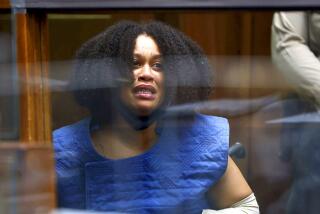2 Families Are Victimized by an Act of Carelessness
- Share via
Jordan Edward Dretzka was due to be born today, May 5, 1991.
“I started wearing maternity clothes at eight weeks,” says his mother. “It was a very big deal to me. I was a parent of two, not a parent of one. I was unbearable. I would tell everyone when I felt him kick. I drove everybody nuts at my office.”
Phyllis Dretzka manages a small smile when she says those words.
A blue-edged baby album, with Beatrix Potter bunnies on the front, the one she bought when they found out it was a boy, rests on her lap. Her face is a bit puffy, red. She has been wiping tears from her eyes once again.
Jordan Edward, named after his great-grandfather, is dead. The official cause: maternal trauma. The one that all of us can understand: a driver, lost en route to a job interview, running a red light.
Phyllis Dretzka, sitting on her living-room couch, is lucky to be alive. Friends and acquaintances tell her this all the time, and by now, she supposes that they might be right. Maybe one day her “old self” will return, to fill this shell.
The car that Phyllis Dretzka was driving through an Irvine intersection on the morning of Jan. 11, a Honda Civic, California license plate UPNKUMG, was crushed.
Phyllis had been driving through a green light, with cars ahead of her and behind, in accordance with the law. She had just left her office, an environmental engineering firm, to drop off some film for developing. Next was to be the train station in Santa Ana, to pick up her boss.
The Nissan pickup, a four-wheel drive, never slowed when Phyllis’ car crossed its path. Its driver did not notice the red light. She was not drunk, nor was she on drugs. She had a road map she was consulting while at the wheel. She figured out that she was going the wrong way and that she needed to turn around on Laguna Canyon Road.
The Nissan slammed into the driver’s side of Phyllis’ car as it headed west on Alton Parkway. Phyllis remembers something hitting her head. Then a man, she doesn’t know who, was holding her hand and telling her, “Sweetheart, it’s going to be all right.” She was covered with glass and her own blood. She wondered why she could hardly breathe.
Phyllis knew in an instant that her baby was gone. She says that she felt something leave.
The driver of the Nissan sustained hairline fractures on her wrists and ankles. She was taken to Irvine Medical Center, treated and released.
The surgeon who operated on Phyllis Dretzka at Western Medical Center’s trauma unit told her family she might not make it through that night. Her father-in-law in Wisconsin bawled over the phone. He was remembering losing his own wife when their son, Phyllis’ husband, was 9 years old.
Phyllis turned 33 this week. Her daughter, Jillian, is 3. Her husband, David, a marketing executive, is 35 by a few days.
The Dretzkas are in love, married for nine years. Their lives had always gone according to plan. They met just out of college, on the job. They’ve worked very hard.
“Everybody knows someone like me,” Phyllis says.
She means how she was before.
When I spoke with Phyllis earlier this week, we spent a good deal of time talking about what justice might be in a case like hers. She says she doesn’t want vengeance and suggests that community service might be an appropriate response.
“She can’t help me,” Phyllis says of the driver, a woman she never wants to meet. “In lieu of flowers for Jordan, please go out and help somebody else.”
The driver of the Nissan, whom I have chosen not to name, was charged with misdemeanor vehicular manslaughter, with negligence, because the baby that Phyllis was carrying was killed. Another misdemeanor charge is for injuries to Phyllis Dretzka.
A 1974 appellate case, however, precludes prosecution for manslaughter when a fetus is involved. At the time the charge was filed, a deputy district attorney at Harbor Municipal Court was unaware of the appellate case. The district attorney’s office says the manslaughter charge, which carries a maximum fine of a year in county jail, will now be dropped.
Which upsets Phyllis Dretzka very much.
“You’re a mother,” she tells me. “How can you feel if they tell you your child’s life means nothing?”
It is a question, of course, where no “answer” can apply. Phyllis has been talking with her priest, a therapist, her husband and friends. She believes she is getting better, although she doubts that she’ll ever happen upon a cure.
The driver of the Nissan, a 23-year-old married to a Marine, is experiencing much of the same pain. She says she is racked with guilt. During most of our conversation, she sobbed over the phone.
“I can’t even look at a baby,” she says, choking out her words. “Every day, when I go to work, I think about what I did. At night, I have dreams about it too. . . . I consider it taking a life because that baby could have been born in a few months.”
This woman, who moved to Fallbrook from Washington, D.C., last Christmas Eve, has worked as a nanny for nearly four years. When I talked with her, she was on her way to work at a child-care center at Camp Pendleton. She takes the bus.
She drives very little now, even though the Department of Motor Vehicles, after a review, has not taken away her right to operate a car.
This woman told me that she had hopes of raising a family of her own, but since the accident, she says, she doesn’t know when, or if, she will ever be psychologically prepared.
She says once she went to a stationery store, planning to buy a card to send to Phyllis Dretzka in the hopes of expressing her remorse.
“I honestly thought I could do it,” she says. “I couldn’t. I don’t know if I could ever say enough. If I tried to talk to her, I’d be like this.”
She is crying so hard I can barely understand her words.
“I’ve done enough damage as it is,” she says.
Phyllis Dretzka, meantime, is unlikely to have any more children herself. Her life, says the surgeon who saved it once, would be at risk. She still doesn’t know when she will be able to return to work. Her physical and mental rehabilitation is far from complete.
“Last night, my husband and I had a big fight,” Phyllis said when she called me the day after we spoke at her Irvine home.
“He says he doesn’t understand why I am doing this, talking about it all, making myself feel so bad. But I have to do what I am. If I don’t, I’m going to be haunted by it years later. People have to understand how much damage carelessness can do. I have to do this for my child, even though it hurts.
“I hurt so bad over this.”
Phyllis was still crying by the time that we hung up the phone.
More to Read
Sign up for Essential California
The most important California stories and recommendations in your inbox every morning.
You may occasionally receive promotional content from the Los Angeles Times.










